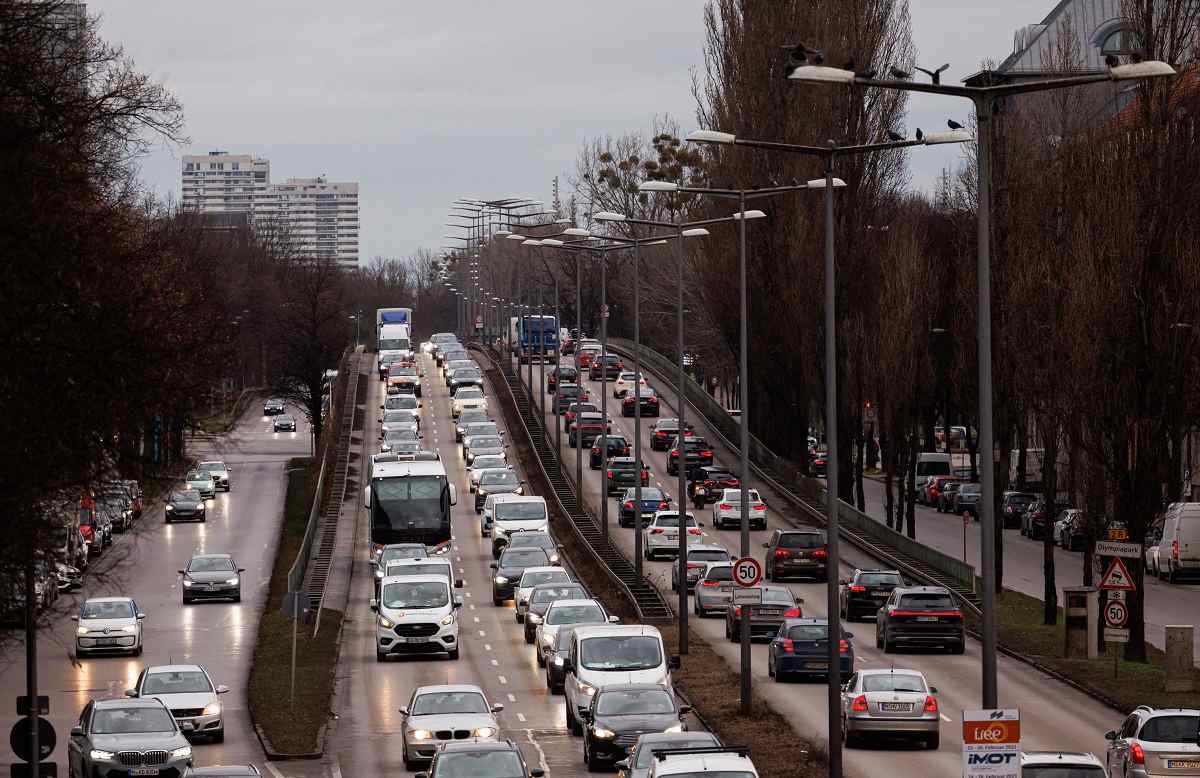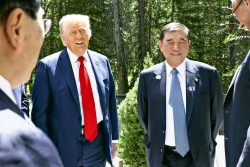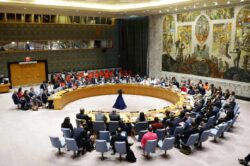
Cars drive on the Mittlerer Ring after the driving ban for vehicles with Euro 5 diesel engines came into force in Munich, Germany, on Feb. 1.
1:00 JST, May 22, 2023
Leaders of the G7 recognized the importance of reducing carbon dioxide emissions from automobiles, not only new cars but also existing vehicle stock. They also agreed to build a system that evaluates decarbonization technologies in a positive light.
On Saturday in Hiroshima, the leaders acknowledged their commitment to decarbonize to achieve a society of net-zero greenhouse gas emissions by 2050 at the latest. They will also accelerate their efforts.
Outcomes of the session where the leaders exchanged opinions on climate change and energy reflected expectations and calculations of individual countries and regions, as the fate of the discussions could significantly impact their industries.
This was particularly seen in discussions on vehicles. About 20% of CO2 emissions come from the transportation sector, including trucks and private cars.
The world has more than 1.5 billion automobiles today. To realize a carbon-free society, it is essential for the automobile sector to transition in that direction.
In a meeting in April, G7 climate, energy and environment ministers came up with a new principle to seek to collectively reduce CO2 emissions from automobiles, not only from new cars but also vehicle stock, by at least 50% by 2035, compared with emissions levels in 2000. The G7 leaders shared the position agreed upon by the ministers.
Individual countries have so far separately presented their own goals on shifts to electric vehicles, but G7 leaders managed to propose realistic endeavors to promote decarbonization of vehicle stock.
‘Fragile agreement’
“It’s a fragile agreement, like glasswork,” said a senior official of the Economy, Trade and Industry Ministry. “It requires careful handling not to provoke its collapse.”
The comment suggested a sense of crisis toward the possibility that the United States, Canada and European nations might seek to set a new target for further accelerating the transition to EVs. The senior official was worried that the discussions on reducing CO2 emissions from vehicle stock that were agreed upon at the environment ministers’ meeting would be rehashed.
The G7 Hiroshima Leaders’ Communique contained the expression various pathways to achieve net-zero greenhouse gas emissions. In this regard, the argument of Japan, which is strong in fuel-efficient vehicles, was reflected in the document. The leaders of the United States and European countries are showing a strong desire to promote the shift to next-generation vehicles in an attempt to reverse the predominance of Japanese automakers, which have a 30% share of the global market.
The European Union and United Kingdom were quick to make clear their plans to completely shift to EVs, focusing their efforts on extending subsidies to EV charging stations among other efforts. Many countries are desperate about attracting and retaining the auto industry. The United States has policies in place to give preferential treatment to EVs produced in North America. In France, President Emmanuel Macron lobbied to lure car battery plants to the country.
Such moves have already become active in the private sector. Germany’s Volkswagen has decided to build a battery factory for EVs in Canada with an eye on the U.S. market.
The G7 leaders’ communique reflected the global competition to seize the initiative toward the goal of achieving the decarbonization of society.
Top Articles in Politics
-

Japan PM Takaichi’s Cabinet Resigns en Masse
-

Sanae Takaichi Elected Prime Minister of Japan; Keeps All Cabinet Appointees from Previous Term
-

Japan’s Govt to Submit Road Map for Growth Strategy in March, PM Takaichi to Announce in Upcoming Policy Speech
-

LDP Wins Historic Landslide Victory
-

LDP Wins Landslide Victory, Secures Single-party Majority; Ruling Coalition with JIP Poised to Secure Over 300 seats (UPDATE 1)
JN ACCESS RANKING
-

Japan PM Takaichi’s Cabinet Resigns en Masse
-

Japan Institute to Use Domestic Commercial Optical Lattice Clock to Set Japan Standard Time
-

Israeli Ambassador to Japan Speaks about Japan’s Role in the Reconstruction of Gaza
-

Man Infected with Measles Reportedly Dined at Restaurant in Tokyo Station
-

Videos Plagiarized, Reposted with False Subtitles Claiming ‘Ryukyu Belongs to China’; Anti-China False Information Also Posted in Japan






















